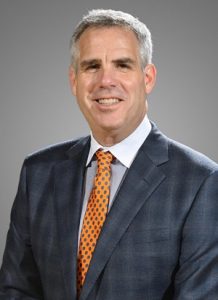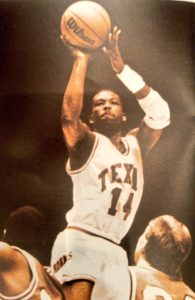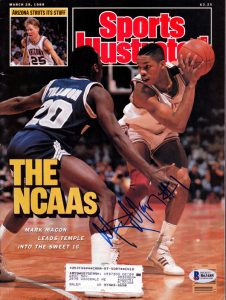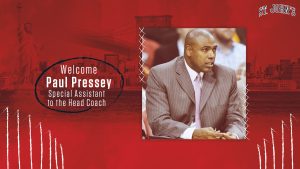CLICK HERE for all of our extensive Preseason Content
We continue our season preview coverage with Belmont SO C Nick Muszynski. Rick Byrd finished up his 33rd and final year as head coach of the Bruins in style last season by going 27-6, winning his 5th OVC regular season title in 7 years of league membership, and beating Temple in the 1st 4 before almost upsetting Maryland. Casey Alexander comes in to replace Byrd and will rely on a sensational sophomore class include the 6’11” Muszynski, who was named conference ROY after finishing top-25 in the nation in both FG%/BPG. HoopsHD’s Jon Teitel got to chat with Nick about his fabulous freshman season and bouncing back from ankle surgery.
You grew up in Ohio: what made you choose Belmont? Ever since I was a kid my ultimate dream was to play in the NCAA Tournament. Belmont offered as great an opportunity as any other school for me to play in the Tournament on a yearly basis. Combine that with the great campus/city, a team that I gelled with from the start, and a top-end coaching staff who I developed a great relationship with…and I had found a perfect fit for myself.
You have a new coach this year in Coach Casey Alexander: what makes him such a good coach, and what is the most important thing that you have learned from him so far? His ability to relate to his players by both demanding that we bring our best everyday but also understanding what it is like to be a student-athlete at this level. The most important thing that I have learned from his thus far is how to handle adversity in a more positive manner. I love the game of basketball and that makes me a very emotional player. Coach has done a great job of trying to help me learn how to channel my emotions in a way that has a positive impact on our team at all times.
You redshirted during your 1st year on campus: why did you decide to do so, and how did it help you become the player you are? Our center position was very cluttered during my freshman year with 4 true centers including myself plus our senior captain Amanze Egekeze (who played a good bit of center in our “small-ball” lineups). I decided that I wanted to get the most out of my 4 playing years at Belmont and focused heavily on the things that I needed to work on the most, which was primarily learning our offensive system, learning how to defend better in 1-on-1 situations down low, and adjusting to the physicality/pace of the college game through lots of practice reps and time in the weight room.
Last year you started 32 games, were named to the All-Conference 1st team, and won the conference ROY award: what did it mean to you to receive such outstanding honors? It means a lot that I was recognized for these awards: I think it speaks volumes about the abilities of my teammates/coaches. The fact that a team with so much talent/leadership/experience (along with such an extraordinary coaching staff) was willing and able to put that amount of trust in myself (along with multiple other young/inexperienced players such as Grayson Murphy/Caleb Hollander/Tate Pierson/Adam Kunkel) says so much about how special our program is here at Belmont.
Your 60.4 FG%/2.2 BPG were both top-25 in the nation: what is the secret to being a great shooter/shot-blocker? When it comes to the FG%, I think the key is just to trust the incredible offensive system that our coaches have in place and trust that all 5 guys will constantly be working to get the very best shot that we can get every time down the floor. When we do that we are a fun, high-paced team that scores a lot of points in a super-efficient manner. As for shot blocking, my size/length obviously have a great deal to do with my ability to block/alter shots on the defensive end, in addition to a sense of timing that I have been working on since I first started to play the game. Ideally I will be able to continue to block shots at a high rate while also improving my 1-on-1 post defense and pick-and-roll defense, which are 2 areas that I have focused on a lot since last season.
You missed the OVC tourney title game with an ankle injury: how did it feel to be unable to face Murray State, and how is your health doing at the moment? Missing the Murray State game was undoubtedly the lowest point last season. Knowing that I was unable to be out on the court and compete with my teammates during our biggest game of the year was heartbreaking, and I was so thankful to get to compete with them 2 more times on the biggest stage. The roller coaster of emotions that we all felt starting that Friday and ending after the Maryland game were more than most teams feel during a whole season. However, I would not change our experience for anything! Shortly following the Maryland game I had surgery on my ankle that kept me sidelined for approximately 4 months. Thanks to the tremendous work of my doctors and our training staff I am back and have been put in a great position to not only be back but be even better than I was before the injury come this November!
In the 2019 NCAA tourney you had 16 PTS in a win over Temple and 3 BLK in a 2-PT loss to Maryland: how close did you come to pulling off the upset against the Terps, and what did you learn from that experience that will help you this year? Obviously with it being only a 2-PT loss it was an extremely close game. However, when you go back to that game you can see there were about 4-5 instances where we missed a loose ball, they got a fingertip on a pass, or we were an inch too far across the baseline from being in a much better position than attempting a half-court heave at the buzzer for the win. The main thing I took from that experience is just how small the margin is between winning and losing. Paying attention to every little detail throughout the course of the game is so critical because you never know which small/minor details will add up to winning or losing the game.
Your non-conference schedule includes road games at BC/Alabama: which of these games do you feel will present your biggest test? We play an incredibly difficult non-conference schedule this season, with teams like St. Louis, Lipscomb (twice), Middle Tennessee, Western Kentucky, and Illinois State on our slate in addition to those 2 games you mentioned. When I look at our schedule I do not see 1 game that stands out but rather a stretch of tough games (almost all of which are on the road) that will force us to bring it every single night and prepare us for our conference slate and ultimately the OVC Tournament in Evansville.
You graduated your top-2 senior scorers from last season in Dylan Windler/Kevin McClain: how will you try to replace all of that offense/leadership? I feel like those are not things that any 1 guy on our team can replace but rather something that we will have to do collectively. One area where I think this team has a leg up on last year’s team off the jump is our depth. This team has even more youth than last season (which is hard to believe because we started 3 freshmen in more than half of our games!) but we have a ton of talent and lots of guys who simply love to play the game of basketball. As for leadership, we have a pair of 5th-year seniors and a handful of underclassmen who played significant roles last year who know what it takes to win big games and play Belmont Basketball the way that it is supposed to be played, so I think collectively we have what it takes to lead this team back into the heart of March.
What are your goals for the upcoming season, and what are your expectations for the upcoming season? I feel like our goals/expectations are fairly similar to most seasons. We want to win the OVC regular season championship, get to Evansville and win the conference tournament, then go to the NCAA Tournament and win some games there too. At the end of the day our expectations are for everyone to bring it every single night, play hard, and play for each other. I am very confident that if we do those things then we are going to accomplish a lot of those goals…and have a whole lot of fun doing it!







